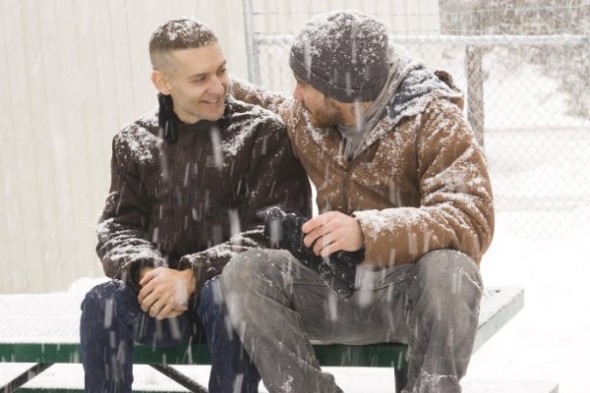
Relativity Media | USA | 110 min
(Warning: minor spoilers)
Big name, studio-pushed family dramas without a “holiday” selling point (a la The Family Stone or Everybody’s Fine) are hard to come by these days. So are successful war films. Jim Sheridan’s Brothers is both of these things, and has fought a long, hard war of its own to open in theaters, literally surviving a recession and all the conflicts that it came with. Sheridan lost funding in the middle of production, unable to shoot the helicopter crash sequence as written by David Benioff, only to finally be saved by an output deal struck between Lionsgate and Relativity Media for 5 films, the first being Brothers.
The film tells the story of the Cahill brothers, Sam (Tobey Maguire) and Tommy (Jake Gyllenhaal). Sam’s the golden boy/war hero headed back for a third term in Afghanistan, Tommy’s the black sheep who is picked up from prison at the film’s beginning by his more impressive, better-loved brother Sam. Their father (a brutal Sam Shepard) is not subtle about who his favorite son is (take a guess) and who is constantly disappointing him. This much is apparent in an early, well-written family dinner scene that meshes comedy and drama nicely, speaking to the absurdity of forcing a bunch of people into a room together (no matter how much they like each other) in the name of family. Gyllenhaal’s Tommy enjoys his strange, awkward return at first, smiling at Sam after each one of their father’s unspoken criticisms, until the old Vietnam veteran tears down the wall and opens up old wounds.
Sam is married to his high school sweetheart Grace (a lovely Natalie Portman), with whom he has two spunky daughters, the younger of the two telling Tommy, upon his return home, that “mommy doesn’t like you.” Aside from his stepmother and kind brother Sam, not many people do.
This all changes when Sam goes back “over there” and reportedly dies in a helicopter crash. As the family falls apart, drowned in grief, Tommy rises to the occasion, turning his life around while helping Grace and her daughters move on. He becomes a stepfather of sortsfor the family, redefining himself in the process. His father even comes around (as much as is possible) and sees the good in his second-best son.
But then, of course, Sam returns home after months held captive by the enemy, tortured both physically and mentally with a Private Joe Willis at his side, who did not make it back home (NOTE: Carey Mulligan has a small role in the film as Willis’ widow and owns her one extended scene, re-confirming both her beauty and talent).
In many ways, this is The Deer Hunter retold for (and through the eyes of) a different generation. It is an out-and-out melodrama that perhaps would have fared better on the stage than on the screen. Not that these young veterans aren’t up for the challenge. Gyllenhaal, Portman and Maguire all give solid performances, but Gyllenhaal carries the life of the film and every scene with him is the better for it. While Sam’s gone (and presumed dead) a star-crossed romance develops between Tommy and Grace. Gyllenhaal and Portman’s chemistry jumps off the screen and those watching will almost wish Maguire’s goodie-two-shoes stayed dead (as horrible as it sounds), a sentiment which hangs guiltily overhead upon his return home. But then, of course, when Sam returns, he is no longer a goodie-two-shoes.
Maguire has had a long career of playing wholesome good guys who hold the virtue of the film they are in. Only lately has he pushed sideways from this persona to darken his ambitions. Between this and 2006’s The Good German he is well on his way. But not quite there yet. Moments that require the personal touch of a specific performer (think of Christopher Walken’s tortured post-traumatic stress in Deer Hunter) are strangely absent in Maguire, who plays the newly-tortured Sam with wide eyes and constant menace but little else. And while these both feel genuine to a character who’s been through so much turmoil, it lacks a certain humanism that viewers will be left wanting for. He’s also playing against Gyllenhaal and Portman, neither of whom have been better, and more assured, in a role before.
Benioff’s script loses steam here and there (the Afghanistan sequences feel cut-and-pasted from other films for the most part), finally derailing at the end via overwrought voiceover. But Benioff is a good writer who knows how people talk in melodramas. His dinner scenes (of which there are a few) are some of the best put on screen in some time. Whether it be Tommy’s awkward return or Sam’s, putting the whole Cahill family together is like lighting dramatic dynamite. By the time it explodes you’ll want it too, just so then the intensity of the scene will subside.
Sheridan’s direction, however, is unusually stale. The camera is there to capture good performances, and not much else. On one hand it’s nice, non-distracting, on the other it’s a wasted opportunity. The majority of the story takes place in a small town, something Sheridan fails to make the most of. This is America, after all, full of families and war heroes and ex-cons. The Cahills could very well be a dime a dozen.
7 out of 10
What did you think of the film? Do you plan to see Brothers?

